Local Ukrainian-American Catholics warn a Russian troop buildup on Ukraine’s border poses a grave threat not only to that nation, but to Europe and democracy itself.
“It is a question of life or death for thousands, who will be massacred by an escalated invasion,” said Archbishop Borys Gudziak, head of the Ukrainian Catholic Archeparchy of Philadelphia. “Probably between three and six million refugees would flood into Western Europe.”
Speaking Jan. 16 by telephone with CatholicPhilly.com, the archbishop described Ukraine as a “bulwark of freedom” against an “authoritarian Putin regime” that is “moving toward totalitarianism.”
[hotblock]
“If Russia succeeds in subjugating Ukraine, chances are the process will continue in the Baltic countries, Central Europe and beyond,” said Archbishop Gudziak.
Eugene Luciw, president of the Ukrainian Congress Committee of America’s Philadelphia chapter, echoed that prediction.
Russian president Vladimir Putin’s demands – including that NATO deny membership to Ukraine and other former Soviet states — show that he wants “to reestablish the sphere of influence the Soviet Union had (by bringing) back the rest of Eastern Europe,” said Luciw, a member of Presentation of Our Lord Ukrainian Catholic Church in Lansdale.
“You can see where the map is going, and where we’re headed,” Luciw said.
‘A comet about to collide with you’
For Ukrainians, “the reality of war … is not a new story,” said Archbishop Gudziak. “Our priests (there) have been burying war dead regularly for over eight years.”
In 2014, Russia annexed Ukraine’s Crimean Peninsula, with Russian-backed separatists proclaiming “people’s republics” in the eastern regions of Donetsk and Luhansk. The move came just 23 years after Ukraine gained independence following the collapse of the Soviet Union, of which it had been a part.
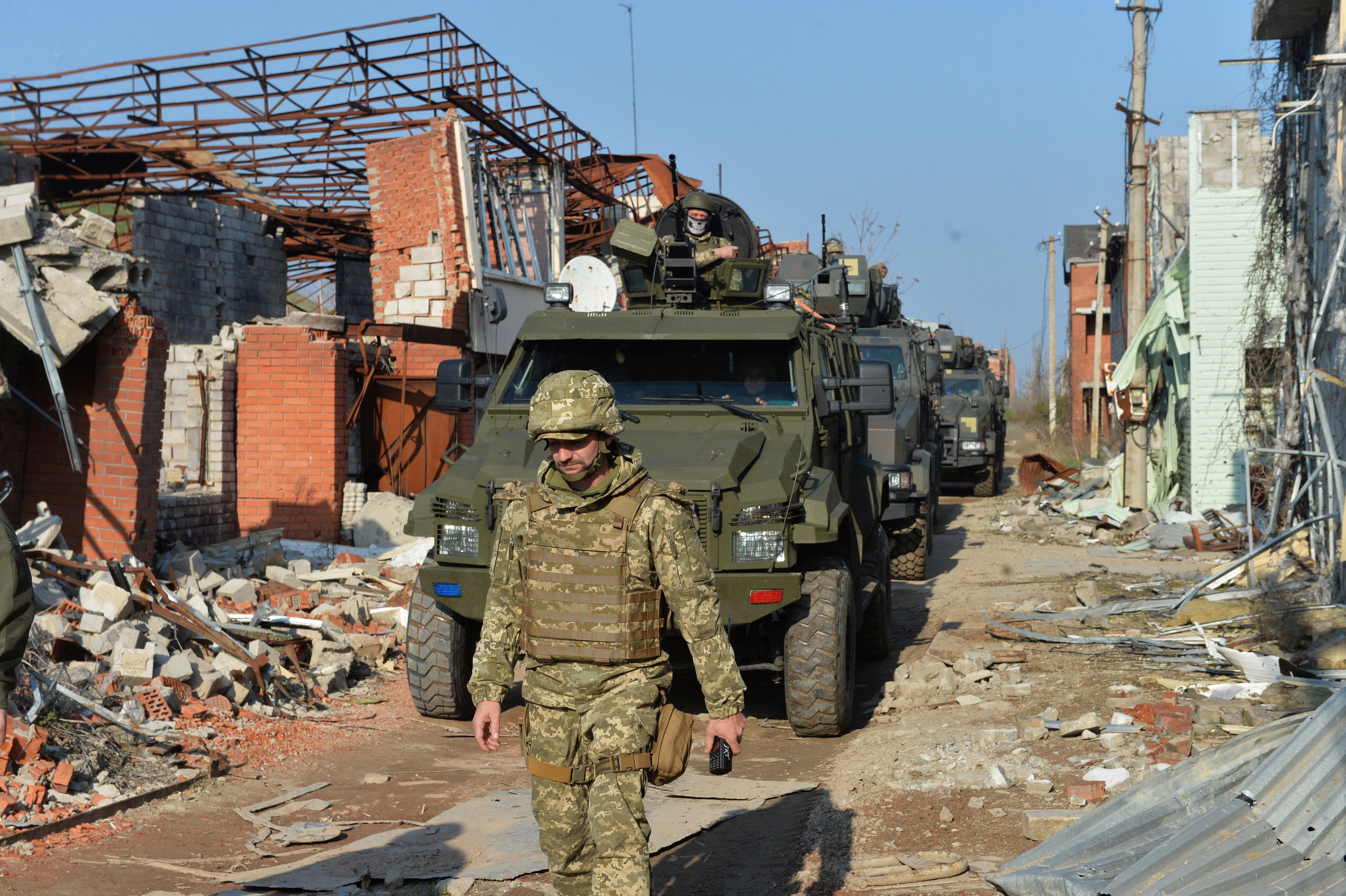
Service members of the Ukrainian armed forces drive military vehicles past destroyed buildings on the line of separation from pro-Russian rebels in Shyrokyne April 21, 2021. (CNS photo/Oleksandr Klymenko, Reuters)
Since the incursion, clashes, shelling and sniper attacks have become common in eastern Ukraine. The United Nations reported close to 1.5 million registered internally displaced persons in the country as of 2021, and at least 3,353 civilian deaths and more than 7,000 civilian injuries between April 2014 and March 2020.
Over the past few months, some 100,000 Russian troops have amassed at the Ukraine border, with as many as 175,000 poised for a military operation in the coming weeks, according to U.S. intelligence officials.
A massive Jan. 14 cybersecurity attack, regarded by many as a prelude to military action, crippled approximately 70 Ukrainian government websites, with an onscreen message warning users to “be afraid and expect the worst.”
The breach, which occurred hours after diplomatic talks between Moscow and Western allies stalled, showed signs of Russian involvement, said Kyiv’s state security service.
[hotblock2]
The online assaults are far from unprecedented, said Archbishop Gudziak.
“The energy grid, businesses and political institutions have been subjected to malware and cyber warfare,” he said. “And all this because Ukraine wants to be free, and Ukrainians insist on their self-determination.”
Although “the reality of war has become part of the fabric of life,” said the archbishop, “the prospect of escalation into war is leading people into a kind of deeper anxiety.”
The U.S. provinces of the Sisters of the Order of St. Basil the Great have issued a message on the “dangerous situation,” expressing “a great concern for the safety” of 165 members of the order’s Ukrainian-based Holy Trinity Province.
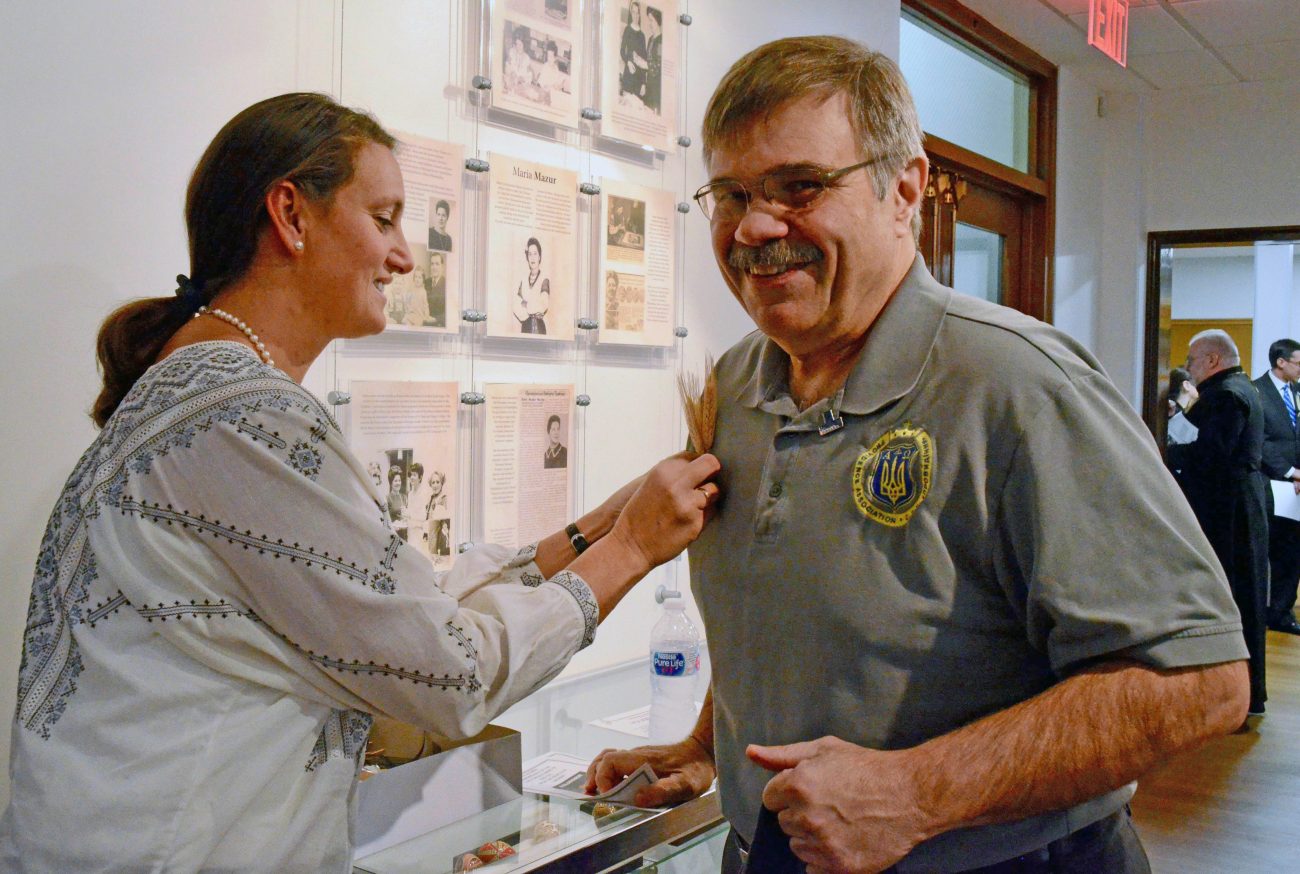
In this undated photo, Manor College trustee and Ukrainian-American leader Eugene Luciw is seen at a commemoration of the Holodomor, a famine engineered by Joseph Stalin that killed some four million Ukrainians between 1932-1933. (Manor College)
“We are equally concerned for a number of other religious communities in Ukraine,” the sisters said.
Leaders of Jenkintown-based Manor College, a Catholic institution long connected to the Ukrainian-American community, released a similar statement.
“The mounting Russian forces on Ukraine’s border have the community throughout Manor College very concerned for the safety and well-being of families and individuals in Ukraine as well as the peoples of all of Eastern Europe,” wrote college president Jonathan Peri.
Manor trustee Leonard Mazur told CatholicPhilly.com by telephone that his family members in Western Ukraine feel as if they are “living with a comet about to collide with (them).”
A witness to freedom, human dignity
The logic behind the Russian aggression is “quite simple,” said Archbishop Gudziak.
“Ukraine is one of the democratic success stories after the fall of communism,” he said. “And a democratic Ukraine with a free press, a growing economy, vibrant ecumenical relations, a political system that is modified by the vote of its citizens, and which is found on the borders of Russia, is a great threat to the system that President Putin has set up. … People look at Ukraine and say, ‘Why can’t we live like that?’”
[tower]
As “a witness to the freedom that Putin has crushed in Russia,” said Archbishop Gudziak, Ukraine offers a visible alternative to a system that “while not classical communism” nonetheless “rejects basic Christian anthropology” and “the teaching of who is a human being.”
“Our faith, our church teaching, the holy Scriptures, which are the basis of Western democracy, have inculcated in us a deep awareness of the fact that we are children of God,” said the archbishop.
That dignity “cannot become a function of some goal,” he said. “You can’t kill millions of people leading humanity to some kind of utopian future, as the communist system has promised.”
Collectively, communist states throughout the world are estimated to have slain 100 million since the 1917 Russian Revolution. In the former Soviet Union alone, between 50 to 60 million people perished through “wars, purges, genocides and ideological repression,” said Archbishop Gudziak.
From 1932 to 1933, at least four million Ukrainians (about 13% of the population) died in the Holodomor, a famine deliberately created by Soviet dictator Joseph Stalin through farm collectivization to “break the back of the Ukrainian peasantry,” the archbishop said.
In addition, the Orthodox Church — which under communism maintained “some form of existence” — was persecuted, while “the Roman Catholic Church was almost completely annihilated, along with many Protestant communities” in Ukraine, said Archbishop Gudziak. “The Ukrainian Catholic Church became the biggest illegal church in the world from 1946 to 1989.”
Luciw said his own family emigrated to escape the religious persecution. Since Eastern Catholic clergy are permitted to marry, his grandfather was a Ukrainian Catholic priest who fled his parish in the Carpathian Mountains for the Allied occupied zones and eventually made his way to the United States.
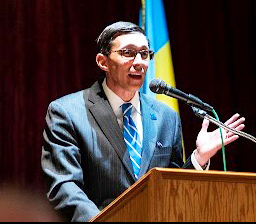
Jonathan Peri, president of Manor College, said in a statement that the school community, deeply rooted in Ukrainian-American affairs, is “very concerned” by the Russian troop buildups along the Ukraine border. (Courtesy Manor College)
“He would otherwise have been arrested, forced to convert to Orthodoxy, sent to a gulag or shot,” said Luciw.
The same desire for freedom burns in Ukrainians today, he said.
“If you talk to a frontline soldier, he or she will say, ‘I want to protect my family and my country, and I wish to protect all of Europe from what is coming if we don’t do it,'” Luciw said. “We know what war means, and therefore we know what peace means. And we know that freedom and peace require sacrifice, prayer and dedication.”
Yet the “great sacrifices Ukraine has made for peace and dignity,” including its 1994 unilateral nuclear disarmament, have not been reciprocated by the international community, said Archbishop Guziak.
“It received a guarantee from Russia, the U.S., Britain and France that its territorial integrity would be recognized and defended,” he said. “Clearly it was not.”
Sanctions against Russia are not necessarily sufficient to deter “what appears to be an imminent, large-scale invasion of Ukraine,” wrote Peri. “Although we see the wisdom in responsive transactional diplomacy, it is imperative that the United States stand firm in communicating and enforcing its resolve to protect the sovereignty and integrity of Ukraine.”
Faith, fables and the power of prayer
Paradoxically, said Archbishop Gudziak, the “colonialist, imperialist plan” of Putin is being endorsed by the Russian Orthodox Church, with which Mikhail Gorbachev restored relations in 1988 while general secretary of the Soviet Union’s Communist Party.
Putin himself professes to be devoutly Orthodox, but Archbishop Gudziak said the alliance between the Moscow Patriarchate and the Russian state is essentially “a fight for grandeur and a fight for territory” based on a nostalgic desire for “past imperial glory,” both “political and ecclesiastical.”
“It is completely antithetical to the Gospel … and has little to do with the Lord Jesus Christ, who was stripped of all power and allowed himself to be crucified, and who raised up the poor and the marginalized,” said the archbishop. “Many Christian communities today repent the historical role their churches have played in subjugating other peoples and other cultures.”
Archbishop Gudziak said the Russian people themselves are “being fed a fable” that Western nations seek to humiliate Russia, which in turn must “flex (its) muscle” and “recover what it has lost” – with Ukraine being “goal number one.”
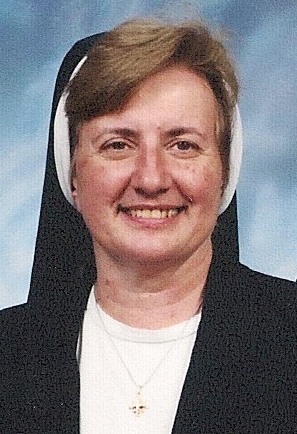
Basilian Sister Ann Laszok, director of religious education in the Ukrainian Catholic Church’s Eparchy of St. Josaphat, said she is praying for both Ukrainians and Russian aggressors amid a looming invasion of Ukraine. (Courtesy Manor College)
The propaganda is also designed to “sow doubt in the minds and hearts” of Westerners, causing them to dismiss the Ukrainian crisis as “(too) complicated” to understand, said the archbishop, who urged Christians in particular to “look at reality in light of the Gospel and know the facts.”
Donating to the U.S. bishops’ annual collection for the church in Central and Eastern Europe helps “the people suffering from the humanitarian crisis in Ukraine,” he said. “The conference has a very competent staff that identifies needs and makes sure contributions of American Catholics are used most effectively, according to the criteria of the Gospel.”
Above all, Archbishop Gudziak stressed prayer is crucial in resolving the Ukraine crisis.
“We Christians recognize that God is the Lord of history, and his grace has effected miracles in human affairs,” he said. “The crumbling of the Soviet Union 30 years ago is one example. That happened not through war, not through armed conflict — it happened peacefully and, I would say, miraculously.”
Luciw agreed that prayer is “instrumental,” adding that “Ukrainians have a special dedication to the Blessed Mother.”
“When there’s an attack by a foreign force, it’s almost like she spreads her arms and protects Ukraine,” he said.
“I pray constantly for all our brothers and sisters in Ukraine who are facing the threat of aggression against their sovereignty and independence,” said Basilian Sister Ann Laszok, a Manor College trustee and director of religious education in the Ukrainian Catholic Church’s Eparchy of St. Josaphat, based in Parma, Ohio.
And those prayers transcend all borders, she noted.
“I also pray for the aggressors, that they may see the light of Christ and de-escalate in order to reinstate peace to all in eastern Ukraine,” said Sister Ann. “We profess a God who so loved the world that he gave his only begotten Son, that whoever believes in him should not perish, but have everlasting life. Why can’t we, as adopted children of God the Father, love each other as God loves us?”
PREVIOUS: Dr. King a ‘prophetic icon’ of love as ‘vaccine to racism,’ says archbishop
NEXT: Changes in clergy assignments announced


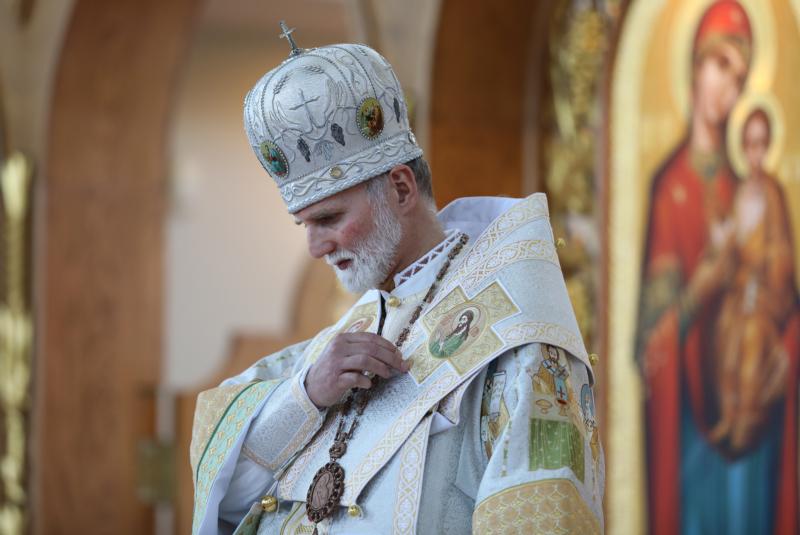
Share this story